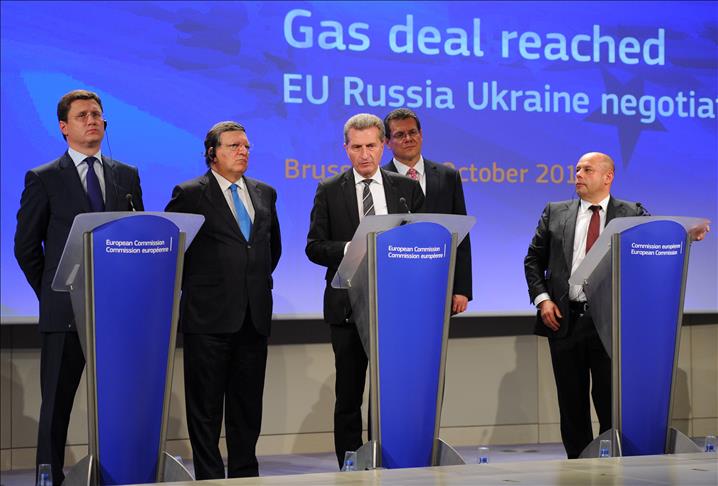
By Ovunc Kutlu and E. Gurkan Abay
ANKARA
The natural gas deal between Russia, Ukraine and the EU will guarantee gas supply to Europe this winter, although it temporarily suspends the disagreements between the countries, say experts.
Moscow, Kiev and the EU signed a deal late in October to secure the flow of Russian natural gas to Ukraine this winter, despite the tensions between the two countries in eastern Ukraine.
Russian natural gas has to run through pipelines in Ukraine to reach European Union countries, which also makes Europe vulnerable to any cut in the Russian supply.
However, this may not be the case as the EU looks like the winner of the deal between Russia and Ukraine by securing Russian gas supply until March at least.
"The only winner of this deal is the EU which has pushed for it," said Anders Aslund, a senior fellow at Washington-based Peterson Institute for International Economics.
"Now the EU can feel reasonably sure that Russia's gas transit will continue through Ukraine during this winter," he added.
The European Commission will serve as a guarantor for the natural gas supplies, while the EU Energy Commissioner Guenther Oettinger brokered the agreement between Ukraine, Russia and the EU.
"The agreement has been mainly a financial deal, backed up by the Europeans," said Cyril Widdershoven, an oil and gas expert with TNO, a Dutch consultancy.
Due to the tensions in eastern Ukraine, the U.S. and EU imposed sanctions on the Russian finance and energy sectors, limiting their abilities to seek funds in western institutions.
"Several billions dollars will be flowing to the Russians, which can make up for part of the economic costs of the sanctions," Widdershoven said.
However, Russia had to make some concessions regarding the price of natural gas in the deal.
"The price dropped by more than $100 below the current $485," said Sijbren de Jong, an analyst at the Hague Centre for Strategic Studies.
"Ukraine will pay $378 per thousand cubic meters for gas in 2014 and $365 in the first quarter of next year," de Jong added.
The mistrust between Russia and Ukraine does not only run through the issues about Crimea in eastern Ukraine, but also on each other's reliability over gas payments and secure supplies.
"The Ukrainians do not believe that Russia will deliver gas but just squeeze cash of out them, while the Russians hoped to squeeze the Ukrainians even more," Aslund said.
Russians may not have pressured Ukraine for more cash, but lowering the amount of natural gas to Ukraine still remains a possibility.
"The deal does not have a ‘take or pay’ clause, so there is no minimum level of gas that Ukraine needs to take," said de Jong, adding the minimum level of gas that Ukraine will get is claimed to be below what it really needs.
"For Russia, this means it can freely decrease the volume it ships to Ukraine as it desires," he added.
The unrest in Crimea and sanctions on Russia
The natural gas deal between the three countries may have solved the gas supply for the winter, however it is expected to have almost no effects on the crisis in eastern Ukraine and the western sanctions against Russia.
"Russia got what it wanted without having to promise a change in its Ukrainian policies," said Widdershoven, adding that Russia is expected to put in place its normal hardline stance.
"Some would argue that a debt to Russia was one of the possible power instruments that were in the hands of the Ukraine. Now, Moscow has all its hands free again to act against Kiev," he added.
Ukrainian national oil company Naftogaz had a total natural gas debt of $4.5 billion to the Russian gas company Gazprom, who cut gas supplies to Ukraine due to Ukraine's failure to pay its debt.
"The deal and the resumption of natural gas from Russia may show the goodwill of Moscow, but it's not enough for the western sanctions to be lifted," de Jong said, and added that in his view, the deal grants goodwill to Russia, but a whole lot more is needed if Russia wishes to see a rolling back of the sanctions.
"If the offensive in eastern Ukraine starts again, which looks increasingly likely, then no sanctions will be rolled back," he added.
Anadolu Agency website contains only a portion of the news stories offered to subscribers in the AA News Broadcasting System (HAS), and in summarized form. Please contact us for subscription options.







